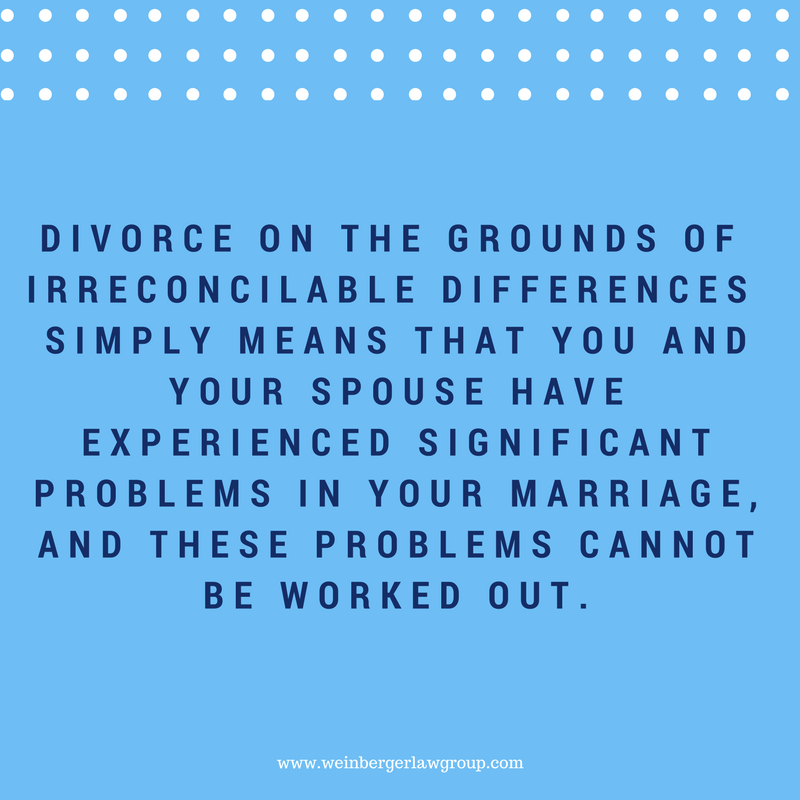Filing for Divorce Based on Irreconcilable Differences in New Jersey
 Did you know that in order to file for and be granted a divorce, you must tell the court your reason(s) for wanting the divorce? These reasons are known as “grounds for divorce” and there are several grounds upon which you can base your complaint. The most common ground cited by divorcing spouses in New Jersey is “irreconcilable differences.” What does this term mean — and how do you know if it’s the right grounds for your divorce?
Did you know that in order to file for and be granted a divorce, you must tell the court your reason(s) for wanting the divorce? These reasons are known as “grounds for divorce” and there are several grounds upon which you can base your complaint. The most common ground cited by divorcing spouses in New Jersey is “irreconcilable differences.” What does this term mean — and how do you know if it’s the right grounds for your divorce?
According to New Jersey law, irreconcilable differences simply means that you and your spouse have been experiencing significant problems in your marriage for at least six months, and that these problems cannot be worked out. There are some requirements to filing based on irreconcilable differences:
- You or your spouse must have lived in New Jersey for 12 consecutive months before the filing of the divorce complaint.
- You and your spouse must have experienced irreconcilable differences for at least six months before you can file.
- The irreconcilable differences make you both believe your marriage should be terminated.
- There is no reasonable belief that you will reconcile your marriage.
Irreconcilable differences in New Jersey is basically a “no-fault divorce,” meaning that unlike other grounds for divorce, such as extreme cruelty, neither you or your spouse has to allege any wrongdoings against the other. This is a much less stressful approach to divorce because there is no airing of dirty laundry or allegations of mistreatment or even abuse put into a court document. This serves to reduce tensions between separating spouses and helps to keep fairly friendly divorces amicable. Studies have shown that the less fighting between spouses during separation and divorce the better it is for the entire family, especially the children. Kids can internalize constant arguing and even begin to feel anxiety or that that must chose sides.
In the complaint for divorce, which, along with the summons, is one of the first documents completed and filed with the court, you simply state the very basics of your marriage, such as when and where you were married and where you and your spouse reside. You then state that you have been experiencing irreconcilable differences in your marriage for at least the last six months, and that these differences have led to the ultimate breakdown of the marriage. You further state in the complaint that you believe the marriage should be ended by the court and that you believe there is no possibility that you and your spouse will work it out and reunite.
Other items contained in your complaint may include your request for division or property or other issues such as custody or child support.
Once your complaint for divorce along with the accompanying paperwork has been filed with the court, you must then serve the papers on your spouse in person. Mailing the papers to your spouse or leaving them on the kitchen table is not proper service. Your spouse, unless they waive their right in a notarized document, has the right to be served in person by a sheriff or a professional process server. If you do not properly serve your spouse, your divorce cannot proceed.
Once served, your spouse has the right to respond to your complaint for divorce. They may deny that your are experiencing irreconcilable differences or they may file a counterclaim for property that you asked for or did not mention. They could also counterclaim for other issues such as child custody or support.
To avoid a long and contentious divorce, it is certainly a wise decision to begin the process with the fairly innocuous grounds of irreconcilable differences. If you and your spouse have a lot of issues in your divorce such as complex custody issues or a high net worth divorce with businesses and stock portfolios, it is always a great idea to attempt to negotiate with your spouse beforehand. If you need more formalized guidance, consider a trained mediator who is experience in all aspects of divorce and family law. The mediator can help you and your spouse come up with a marital settlement agreement that works for your entire family, while advising you on what is reasonable and legal in New Jersey.
Some divorcing spouses believe that if they are granted a divorce based on fault such as extreme cruelty or adultery, the court will award them more money or a bigger chunk of the marital assets as a way to punish the other spouses “bad” behavior. This is not the case. The court looks at your marriage as a business and will divide assets and debts based upon what is equitable, not upon blame. However, if you believe that your spouse has spent marital money on an affair, it may be possible to recoup those monies in the divorce. Talk to a family law attorney if this is your situation, as it may be wise to file for divorce based on adultery in this case.
Always consider at least a consultation with a qualified family law attorney in your area. Even if your divorce appears to have few or no issues, there may be issues that you have simply not considered. Or, your divorce may have begun on a amicable note, but has since become contentious or contested by your spouse.
Thinking about divorce? Ready to file? We’re here to help you explore all your options. When you are ready, please contact us to schedule your initial consultation with one of our skilled family law attorneys to get advice and guidance on your particular situation. Call us at 888-888-0919.
Read More:
How do I start filing for a divorce in New Jersey?
Grounds for a New Jersey Divorce
7 Steps To Filing For Divorce In New Jersey




